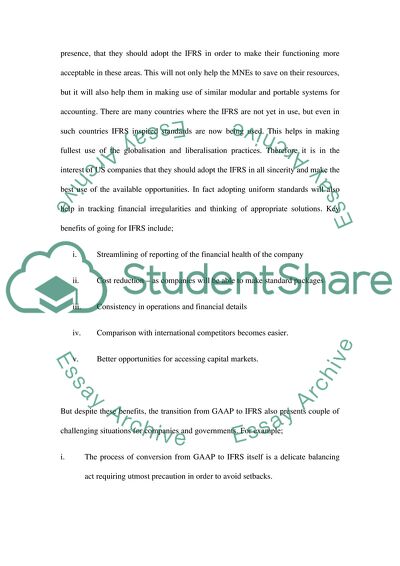
- Home
- Free Samples
- Premium Essays
- Editing Services
- Extra Tools
- Essay Writing Help
- About Us
- Studentshare
- Subjects
- Miscellaneous
- What are IFRS What body issues IFRS Why is conversion to IFRS important for U.S. companies What are some issues involved in the conversion from GAAP to IFRS
What are IFRS What body issues IFRS Why is conversion to IFRS important for U.S. companies What are some issues involved in the conversion from GAAP to IFRS - Essay Example

- Subject: Miscellaneous
- Type: Essay
- Level: Undergraduate
- Pages: 4 (1000 words)
- Downloads: 0
- Author: jeanette65
Extract of sample "What are IFRS What body issues IFRS Why is conversion to IFRS important for U.S. companies What are some issues involved in the conversion from GAAP to IFRS"
order to make the accounting practices contemporary, yet the full version of IFRS came into being in the year 2005 when more than 8000 companies in the EU region decided to adopt these standards (Banerjee, 2008). More than 100 countries have formally accepted IFRS as the standards for preparing financial statements and to become compatible with each other. IFRS are issued by the International Accounting Standards Board (IASB), a private sector international body. In fact IASB itself is a new body, which emerged on the international scene in the year 2001, by replacing the International Accounting Standard Committee (IASC).
With the increasing acceptance of these standards around the world, it appears all the more necessary for multinational enterprises (MNE) and countries with global presence, that they should adopt the IFRS in order to make their functioning more acceptable in these areas. This will not only help the MNEs to save on their resources, but it will also help them in making use of similar modular and portable systems for accounting. There are many countries where the IFRS are not yet in use, but even in such countries IFRS inspired standards are now being used.
This helps in making fullest use of the globalisation and liberalisation practices. Therefore it is in the interest of US companies that they should adopt the IFRS in all sincerity and make the best use of the available opportunities. In fact adopting uniform standards will also help in tracking financial irregularities and thinking of appropriate solutions. Key benefits of going for IFRS include; ii. The IFRS put greater emphasis on treating the financial statements as strategic tools instead of the traditionally held view.
This mandates proper mechanism for taking feedback and prepare strategic plans The Framework for the Preparation and Presentation of Financial Statements helps in understanding the basic rules and principles for IFRS. This way we get to know how to prepare financial
...Download file to see next pages Read More
- TERMS & CONDITIONS
- PRIVACY POLICY
- COOKIES POLICY